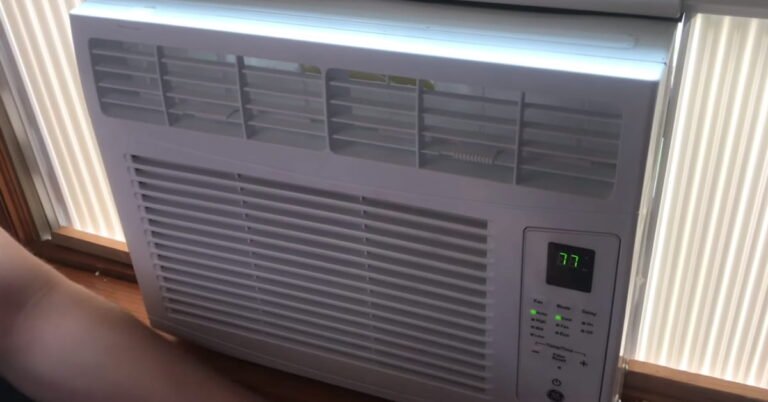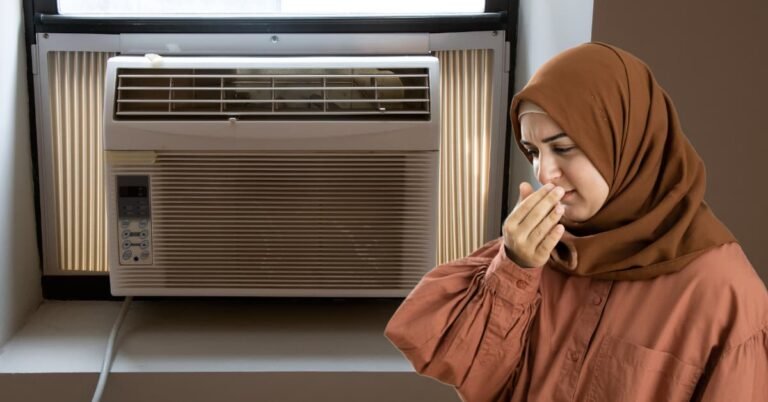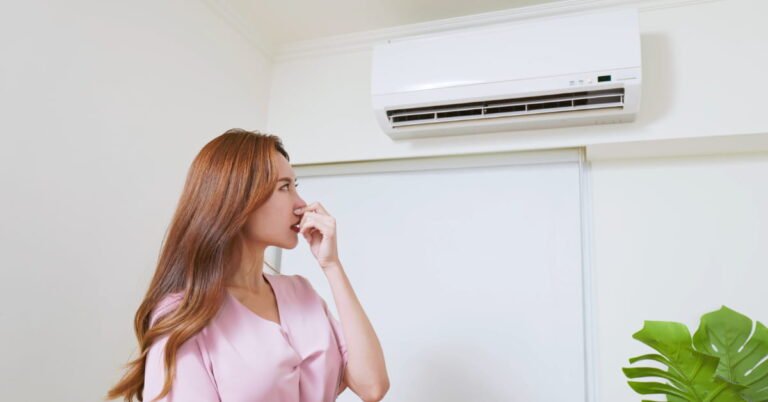Portable Air Conditioner Making Water Noise- How To Fix
Are you experiencing the frustration of a portable air conditioner making water noise? You’re not alone. Many users have faced water noise issues with these units, but the good news is that it’s usually solvable with simple steps.
In this guide, we’ll explore the potential causes of water noise and discuss how to resolve it for a quieter and more comfortable cooling experience.
Reasons For Portable Air Conditioner Making Water Noise
Here are the common reasons why a portable air conditioner might make water noise.
- Condensation Drip
- Blocked or Clogged Drainage
- Improper Tilt or Leveling
- Dirty or Clogged Filters
- Low Refrigerant Levels
- Humid Conditions
- Inadequate Insulation
- Faulty or Damaged Parts
- Incorrect Installation
It’s essential to identify the specific cause in your situation to address the issue effectively.

1. Condensation Drip
When you have your portable air conditioner running, it’s diligently working to cool and dehumidify the air. As it does so, moisture in the air condenses on the unit’s cooling coils. This condensed moisture collects in a tray or pan within the unit. Here’s where the issue arises.
The collected condensation water needs to find its way out of the unit. Typically, this is achieved through a drainage system. However, if this drainage system gets obstructed or doesn’t function correctly, you might start hearing the unmistakable sound of water droplets hitting the bottom of the tray or splashing around.
To mitigate this issue, regular maintenance is crucial. Cleaning the unit’s drainage system, checking for blockages, and ensuring proper water flow can go a long way in preventing condensation drip and the accompanying water noise.
So, next time you hear those pesky water droplets, you’ll know it’s time to show your trusty portable air conditioner a little TLC.
2. Blocked or Clogged Drainage
If you’re familiar with portable air conditioners, you know they cool and dehumidify the air. During this process, moisture from the air condenses on the cooling coils inside the unit, forming water droplets. To prevent moisture problems, portable ACs have a drainage system to remove collected water.
Now, here’s where things can go awry. If the drainage system becomes blocked or clogged, water can’t flow freely. Instead, it backs up inside the unit, leading to that annoying water noise you’re experiencing. It’s like a traffic jam in your air conditioner.
To address this, regular maintenance is your ally. To silence water noise and maintain your portable air conditioner’s efficiency, clean the drainage system, remove obstructions, and ensure smooth water flow.
3. Improper Tilt or Leveling
Water noise often occurs from improper tilt or leveling of the unit. It’s important to understand how this can happen.
Portable air conditioners cool and dehumidify the air by condensing moisture on their cooling coils. To manage this moisture, the unit relies on a drainage system that allows water to flow away. Improper air conditioner positioning may hinder water drainage, leading to noticeable water noise.
To rectify this issue, it’s crucial to ensure that your portable AC is placed on a level surface. Even a slight tilt or imbalance can disrupt the drainage process, leading to water noise. Level your unit carefully for proper water drainage.

4. Dirty or Clogged Filters
You know portable AC devices cool and dehumidify the air. To achieve this, they draw in air, filter out dust and debris, and cool it before releasing it back into the room.
Now, here’s where the trouble begins. Over time, these filters can become clogged with dirt, dust, and other particles from the air. When this happens, the airflow through the unit is restricted, causing the cooling coils to become too cold. Excess condensation forms and the sound of water droplets hitting the cold coils becomes audible.
To remedy this, regular filter cleaning is essential. Keep filters clean to ensure efficient air conditioner function, reducing excess condensation and water noise. It’s a simple but effective step to keep your cooling experience peaceful and enjoyable.
5. Low Refrigerant Levels
Water noise can be caused by low refrigerant levels, so it’s important to understand why.
Portable air conditioners, as you’re aware, operate by cooling and dehumidifying the air. This involves the circulation of refrigerant within the unit, which helps in the cooling process. Low refrigerant levels can disrupt system balance.
Low refrigerant levels can make evaporator coils too cold, causing excess condensation and water noise. To solve this problem, consult a professional technician to diagnose and fix the refrigerant levels in your portable AC. Maintain proper refrigerant levels for efficient cooling and no unwanted water noise.
6. Inadequate Insulation
Portable air conditioners operate by cooling and dehumidifying the air. During this process, moisture from the air condenses on the unit’s cooling coils. Normally, this moisture should remain contained within the unit.
However, inadequate insulation around the cooling coils can allow condensation to accumulate on the exterior of the unit. When this happens, you might start hearing the distracting sound of water droplets or even a gentle trickling noise.
To address this issue, it’s essential to ensure that your portable air conditioner is properly insulated. This helps contain the condensation within the unit, preventing it from making noise. If you suspect inadequate insulation, consult a professional technician for insulation improvement.
7. Faulty or Damaged Parts
Water noise can result from faulty or damaged unit parts. It’s crucial to understand how this can happen.
Portable air conditioners cool and dehumidify the air using different components. Damage or malfunction of these parts can cause moisture management issues and water noise.
To resolve this issue, it’s essential to have your unit regularly inspected and serviced by a qualified technician. They can identify and replace faulty or damaged parts, ensuring efficient and quiet operation of your portable air conditioner.
8. Incorrect Installation
Water noise is often caused by improper unit installation, so it’s important to understand how this can happen.
If the unit is not installed correctly, it can disrupt this delicate balance and lead to issues with moisture management, resulting in water noise.
To tackle this, make sure your portable air conditioner is installed as per the manufacturer’s instructions. For proper installation, position the unit on a level surface, secure the exhaust hose correctly, and ensure all components are connected as specified. By following these steps, you can minimize water noise and enjoy the cooling benefits of your portable AC without disruption.

To Prevent Future Water Noises From AC Follow These Steps
To Future prevent your air conditioner from making water noises, follow these steps for a quieter and more comfortable cooling experience:
1. Regular Cleaning: As someone experienced with using air conditioners, you understand that cleanliness is key. Start by cleaning or replacing the unit’s filters. Dirty filters can disrupt airflow and cause excess condensation, leading to water noise.
2. Inspect Drainage System: Carefully examine the drainage system, including the drain pan and drainage hoses. Ensure they are free from obstructions, debris, or blockages that might hinder water flow. Cleaning these components can help prevent water noise.
3. Proper Tilt and Leveling: As someone who has used air conditioners, you know that correct installation matters. Make sure your unit is positioned on a level surface. Even a slight tilt can affect drainage and lead to water noise.
4. Monitor Humidity: Consider using a separate dehumidifier if you frequently encounter high humidity levels. Lowering room humidity reduces the amount of condensation your air conditioner needs to manage, minimizing water noise.
5. Professional Inspection: Schedule regular maintenance by a qualified HVAC technician. They can identify and address any potential issues, such as low refrigerant levels or faulty components, which can contribute to water noise.
6. Use a Drain Pan Alarm: As someone who values a quiet environment, you might find it beneficial to invest in a drain pan alarm. This device can alert you when the drain pan is getting full, prompting you to empty it before it overflows and causes noise.
7. Avoid Overcooling: Consider adjusting the temperature settings to avoid overcooling the room. Running the air conditioner at a lower setting can reduce the amount of condensation and water noise.
Conclusion
Having experienced the occasional annoyance of a portable air conditioner making water noise, it’s clear that proactive steps are essential. Regular maintenance, including filter cleaning and drainage system checks, helps maintain a peaceful cooling environment.
Proper installation, positioning, and monitoring of humidity levels can further minimize water noise. Engaging professional technicians for regular inspections ensures efficient operation. With these measures, one can enjoy the cooling benefits of a portable air conditioner without the disruptions of unwanted water noises.






